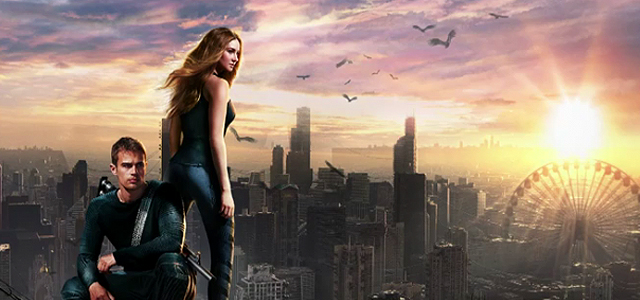(M) Shailene Woodley, Theo James, Kate Winslet, Ashley Judd, Tony Goldwyn
There are no surprises in this YA adaptation. Summit Entertainment have been looking for a franchise since the Twilight films. The problem with Divergent is it doesn’t seem to diverge (excuse the pun) from what has become a fairly well-worn template.
There seems to also be no way of mentioning this film without comparing it to The Hunger Games – and unfortunately the comparisons aren’t all that favourable.
The themes seem too similar, the heroines interchangeable (although Jennifer Laurence is a far superior actor to Shailene Woodley) and the narrative arcs the same.
Divergent takes place in a dystopian future. It’s post-apocalyptic Chicago seems ordered if oppressive. It’s a walled-in society (although in this instalment we are not told why, that apparently is for the greenlit sequel to elaborate further) that is broken up into five “factions” that run various parts of society. The factions are a sort of organised caste system where your gifts and talents determine which faction you belong in. So far, so much like the Districts in The Hunger Games where districts perform certain functions for the Capital.
But back to Divergent: Your faction defines what you do with your life: service (Abnegation, the public servants), intelligence (Erudite, the scholars), peacefulness (Amity, the farmers), honesty (Candor, the lawyers and judges), and fearlessness (Dauntless, the protectors). Those who belong to no faction are labelled factionless and are societies cast offs, without a faction they are homeless and unprotected.
When teenagers turn 16 they take aptitude tests to give them an idea what they are most suited for. Many end up in the factions they were raised in. In a ceremony the teenagers choose their faction and they chose for life.
This is where we join the story and our heroine Beatrice (Woodley). Beatrice was raised in Abnegation by her loving and competent mother (Ashley Judd) and father (Tony Goldwyn), who is second in command to the leader of the society. But her test results are inconclusive, a point that freaks her tester out enough to make her usher Beatrice out the back door and warn her to tell no one, not even her family.
Beatrice and her brother choose Dauntless and Erudite to the disappointment of their parents and thus begins the trials of Beatrice as she discovers just how hard it will be to fit in to her new faction.
During the exhaustive and harrowing training Beatrice discovers she is unique, that she posseses all the five personality traits – she is in fact Divergent. Society can’t deal with someone who doesn’t fit in and so Tris as she calls herself becomes a threat to everyone around her including her mentor and love interest Four (Theo James).
Perhaps the most frustrating points about the film (and I haven’t read the book so can’t comment) is that many details remain unclear. It is never explained why being Divergent is a threat to society, although one suspects it’s because it goes against the fascist order. We are never told why this dystopian society has divided in this way and furthermore why such an oppressive system is accepted by its supposedly enlightened inhabitants.
Like many of the other holes in this perfunctory screenplay, the film seems to be hitting its marks, rather than giving us a reason to care why Beatrice is in danger.
While it asks many intriguing questions, it doesn’t fully commit to the answers, which is why we go back to The Hunger Games. It also doesn’t have any political or social menace. The television landscape is full of intelligent debate about societal politics: House of Cards, The Newsroom, even Game of Thrones bring more commentary than is attempted here.
Support cast members have thankless tasks. Kate Winslet seems to be lost as the villain – and seems to be cast for her gravitas rather than her ability to flesh out what appears to be a rather one note character. Donald Sutherland’s President Snow by comparison … well there is no comparison. What he is able to do in a few short scenes is superb in The Hunger Games.
Ashley Judd and Tony Goldwyn’s turns as Beatrice’s parents are also lost. We can’t sympathise with a family unit that can split with little or no angst. Although Judd’s third act reappearance helps us understand Beatrice’s choices – it feels too little too late.
Divergent left me not wishing to compare it so harshly to The Hunger Games, but comparisons are inevitable. It also left me wishing it had more fully fleshed out the political and social landscape rather than focussing on Beatrice’s rise up through the ranks of Dauntless for the entire middle of the film. A long montage perhaps but not a full 50 minutes. This makes the climax feel truncated and almost like an oversight.
The film does have some take home messages: that our talents can be used for justice, that we should think of others rather than ourselves. One other plot point seems worth mentioning here: those raised in Abnegation are expected to always think of others, rather than themselves. And so they also are raised to avoid mirrors, to not think about themselves, to not think about their own talents and skills and strengths in deference to others. A little extreme, but in a film aimed at teenagers this is worthy of discussion.
Of course, caring for others is at the heart of Christianity. Divergent isn’t a great film, but if it fosters discussion among teenagers about standing up for the truth, being wise, exercising courage, and fostering peace and it’s definitely worth a look.
Adrian Drayton













